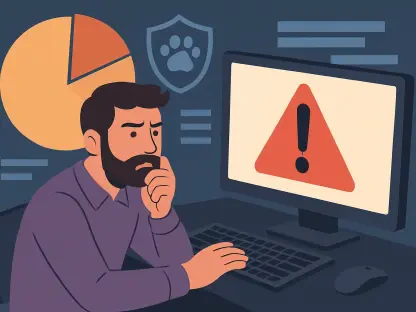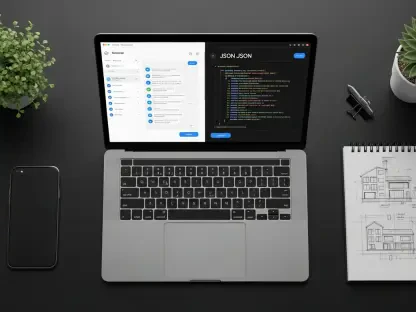In an era where mobile applications underpin nearly every aspect of business and personal interaction, the stakes for securing these digital tools have never been higher. Cybercriminals are relentlessly targeting mobile apps to exploit vulnerabilities, steal sensitive data, and disrupt operations, making robust security measures not just an option but a necessity. Mobile app penetration testing, a process where ethical hackers simulate real-world attacks to uncover weaknesses, stands as a critical defense against these threats. As reliance on apps for everything from banking to customer engagement grows, businesses must prioritize partnerships with top-tier testing firms to safeguard their digital assets and maintain user trust. The landscape of cybersecurity is evolving rapidly, with sophisticated attack methods emerging daily, pushing the demand for expert testing services to an all-time high. This article explores the leading mobile app penetration testing companies, delving into their unique strengths and approaches to help organizations—whether sprawling enterprises or nimble startups—find the right partner. From innovative tools to hands-on expertise, these firms are shaping the future of mobile security by addressing both common and complex vulnerabilities. With a focus on actionable insights and compliance, the best providers ensure that developers can fix issues efficiently while aligning with industry standards. Navigating this space requires understanding the diversity of offerings, from scalable platforms to niche services, to make an informed decision that matches specific business needs.
Why Mobile App Penetration Testing Matters
The Rising Threat Landscape
As mobile applications become the cornerstone of business operations and user engagement across industries, their prominence has drawn the attention of cybercriminals looking to exploit any security gaps. The threat landscape is expanding at an alarming rate, with attacks ranging from data breaches to malware injections targeting sensitive information stored on or transmitted through apps. Whether on iOS or Android platforms, mobile apps are often a gateway to personal and financial data, making them lucrative targets for malicious actors. Penetration testing plays a pivotal role by proactively identifying vulnerabilities—such as insecure data storage or weak authentication mechanisms—before they can be leveraged for harm. This simulated attack approach mimics real-world hacking techniques, providing a clear picture of an app’s defenses under pressure. Without such testing, businesses risk falling victim to sophisticated exploits that can compromise user privacy and disrupt operations, emphasizing the urgent need for reliable security assessments in today’s digital ecosystem.
Beyond the sheer volume of threats, the complexity of attacks continues to escalate as hackers employ advanced tactics like phishing, ransomware, and API exploitation tailored specifically for mobile environments. The rapid adoption of mobile apps for remote work and e-commerce has only intensified this risk, with cybercriminals capitalizing on rushed development cycles that often prioritize speed over security. Penetration testing firms counter these dangers by staying ahead of emerging threats, using both cutting-edge tools and expert analysis to uncover hidden flaws. This proactive stance is essential in a landscape where a single breach can cascade into widespread damage, affecting not just the targeted organization but also its partners and customers. By simulating adversarial behavior, testing services provide a critical layer of defense, ensuring that apps are fortified against the evolving methods of attack seen in the current digital climate.
Impact on Business and Users
The consequences of a security lapse in a mobile app can be catastrophic, reverberating far beyond the immediate technical failure to impact both businesses and their users on multiple levels. A breach often results in the theft of sensitive user data—such as payment details or personal identifiers—leading to direct financial losses and potential identity fraud for individuals. For companies, the fallout includes not only monetary damage from fines or lawsuits but also a severe erosion of customer trust, which can take years to rebuild. Penetration testing mitigates these risks by identifying weaknesses before they are exploited, allowing organizations to address issues discreetly and maintain their reputation as a secure provider. This preemptive approach is vital in an age where data privacy concerns dominate public discourse, and users are quick to abandon brands that fail to protect their information.
Moreover, the ripple effects of a security incident can disrupt business continuity, with downtime or compromised systems halting operations and alienating partners who rely on seamless integration. Regulatory penalties add another layer of concern, as non-compliance with standards like GDPR can result in hefty fines that strain financial resources. Penetration testing serves as a safeguard by ensuring that vulnerabilities are patched and compliance is maintained, preventing legal repercussions while fostering a culture of accountability. By investing in thorough testing, businesses demonstrate a commitment to user safety, which can become a competitive advantage in markets where trust is a key differentiator. Ultimately, the value of penetration testing lies in its ability to protect the intricate web of relationships and operations that depend on secure mobile applications, preserving both economic stability and user confidence.
Key Criteria for Selecting a Testing Firm
Balancing Automated and Manual Testing
When evaluating mobile app penetration testing firms, one of the foremost considerations is how they strike a balance between automated tools and manual expertise to deliver comprehensive security assessments. Automated scanning is prized for its speed, enabling rapid detection of common vulnerabilities like outdated libraries or misconfigured settings across large codebases. However, such tools often fall short in identifying intricate issues, such as business logic flaws or context-specific risks, which require the nuanced insight of human testers. Leading firms in the current market adopt a hybrid model, leveraging automation for efficiency while relying on skilled professionals to dig deeper into complex vulnerabilities. This dual approach ensures that no aspect of an app’s security is overlooked, providing a robust defense against a wide spectrum of threats tailored to both iOS and Android environments.
This hybrid methodology is particularly crucial given the diverse nature of mobile app architectures, where a one-dimensional testing strategy can leave critical gaps in security and functionality. Manual testing excels in scenarios involving user workflows or custom-built features, where automated scripts might miss subtle but exploitable errors. Conversely, automation handles repetitive tasks with precision, scanning for known vulnerabilities at a scale that manual efforts cannot match. Top-tier companies understand that combining these strengths creates a synergy that maximizes coverage and accuracy. By integrating both approaches, these firms cater to businesses seeking thorough evaluations without sacrificing turnaround time, ensuring that vulnerabilities are caught early—whether they stem from coding oversights or sophisticated attack vectors that demand human intuition to detect.
Quality of Reporting and Support
Another pivotal factor in choosing a penetration testing firm is the quality of reporting and ongoing support provided after vulnerabilities are identified, as this directly influences how effectively issues can be resolved. The best companies deliver detailed, developer-friendly reports that prioritize risks based on severity and potential impact, ensuring that technical teams can focus on the most pressing threats first. These reports go beyond mere lists of flaws, offering clear remediation guidance that demystifies complex security jargon and provides actionable steps for resolution. Such clarity prevents development teams from being overwhelmed by ambiguous findings, streamlining the process of fortifying an app against identified weaknesses and maintaining operational momentum during security enhancements.
Equally important is the level of post-testing support offered by a firm, which can make a significant difference in how smoothly vulnerabilities are addressed. Leading providers stand out by offering direct consultation with security experts who can explain findings in depth and assist with implementation challenges. This hands-on engagement ensures that even teams with limited security expertise can navigate the remediation process confidently. Additionally, some firms provide follow-up testing to verify that fixes have been applied correctly, closing the loop on potential risks. By prioritizing both high-quality reporting and robust support, top testing companies empower businesses to transform security insights into tangible improvements, fostering a proactive rather than reactive approach to mobile app protection.
Compliance and Industry Standards
Adherence to regulatory and industry standards is a non-negotiable criterion when selecting a penetration testing firm, especially for organizations operating in sectors with strict legal requirements. Standards such as GDPR, PCI-DSS, HIPAA, and the OWASP Mobile Top 10 serve as benchmarks for ensuring that mobile apps handle data responsibly and securely. Top firms distinguish themselves by integrating compliance-focused testing into their methodologies, identifying gaps that could lead to legal or financial penalties if left unaddressed. Their expertise in these frameworks helps businesses align with mandatory guidelines, reducing the risk of non-compliance while demonstrating due diligence to regulators and stakeholders alike.
Beyond merely meeting requirements, the best testing providers offer detailed compliance reporting that maps vulnerabilities to specific standards, providing a clear roadmap for achieving and maintaining adherence. This is particularly valuable for industries like finance or healthcare, where data breaches can have severe repercussions beyond immediate losses. These firms also stay updated on evolving regulations, ensuring that their testing practices reflect the latest mandates and protect against emerging compliance risks. By partnering with a provider well-versed in these standards, businesses gain not only technical security but also the assurance of operating within legal boundaries, safeguarding their operations from penalties and preserving trust with users who expect rigorous data protection measures.
Trends Shaping the Industry in 2025
Integration with DevSecOps
A transformative trend in the mobile app penetration testing industry is the growing integration with DevSecOps practices, which embed security into every phase of the software development lifecycle. As businesses increasingly adopt continuous integration and continuous deployment (CI/CD) pipelines to accelerate app releases, the need for seamless security testing within these workflows has become paramount. Leading testing firms have adapted by offering tools and services that integrate directly with development environments, enabling automated scans and real-time feedback without disrupting coding or deployment schedules. This “shift-left” approach ensures that vulnerabilities are detected and addressed early, long before they can escalate into costly breaches during later stages or post-launch.
The benefits of this integration extend beyond mere efficiency, fostering a cultural shift where security becomes a shared responsibility among development, operations, and testing teams. Top firms provide APIs and plugins that connect with popular CI/CD platforms, allowing for continuous monitoring and immediate alerts on potential issues as code is written or updated. This proactive stance contrasts sharply with traditional, siloed security assessments conducted after development, which often delay releases and burden teams with extensive fixes. By aligning with DevSecOps principles, these testing providers help organizations build more secure apps from the ground up, reducing risk while supporting the fast-paced innovation demanded in today’s competitive mobile app market.
Rise of AI and Automation
Artificial intelligence and advanced automation are reshaping the landscape of mobile app penetration testing, offering unprecedented speed and precision in identifying vulnerabilities. AI-driven tools analyze vast amounts of code and data to detect patterns indicative of security flaws, often predicting potential risks before they manifest into exploitable issues. This capability is particularly valuable for handling the scale and complexity of modern mobile apps, where manual testing alone would be impractical. Leading firms have embraced these technologies to enhance their automated scanning processes, delivering faster results that keep pace with rapid development cycles while maintaining a high degree of accuracy in flagging common vulnerabilities.
However, while AI and automation bring significant advantages, they are not without limitations, particularly when it comes to nuanced or context-dependent threats like business logic errors. Recognizing this, top testing providers pair these cutting-edge tools with human oversight to ensure comprehensive coverage. Expert testers validate AI findings, dive into areas where automation may falter, and provide the critical thinking necessary for complex scenarios. This balanced approach maximizes the strengths of both technology and expertise, ensuring that businesses receive thorough assessments without sacrificing depth for speed. As AI continues to evolve, its role in penetration testing is set to expand, promising even more sophisticated detection capabilities in the coming years, from now through at least 2027.
Focus on Mobile-Specific Security
With mobile ecosystems presenting distinct challenges compared to other digital platforms, a notable trend is the rise of testing firms specializing in mobile-specific security. Issues such as insecure API connections, on-device data leaks, and vulnerabilities tied to stolen device scenarios require a deep understanding of iOS and Android environments—expertise that generic security tools often lack. Mobile-first providers have emerged as leaders by focusing exclusively on these platform-specific risks, employing tailored methodologies that address the unique architecture and user behaviors associated with mobile apps. This specialization ensures that vulnerabilities unique to mobile contexts are not overlooked in broader security assessments.
The emphasis on mobile-centric testing is driven by the recognition that traditional application security approaches fall short when applied to the dynamic and fragmented nature of mobile ecosystems. These specialized firms often incorporate testing for scenarios like app behavior on jailbroken or rooted devices, as well as risks stemming from third-party app stores or sideloading. By prioritizing such threats, they offer a level of precision that is critical for businesses whose primary user engagement occurs via mobile channels. As mobile usage continues to dominate digital interactions, the demand for providers with this focused expertise is likely to grow, reinforcing the importance of choosing a firm that understands the intricacies of mobile security over a one-size-fits-all solution.
Diversity of Top Firms for Varied Needs
Scalable Solutions for Enterprises
For large enterprises managing multiple mobile apps and complex digital infrastructures, scalability in penetration testing services is a defining factor in selecting a provider. Leading firms in this category offer comprehensive platforms that handle end-to-end security needs, from initial vulnerability scans to ongoing monitoring across diverse app portfolios. These providers excel in integrating automated testing tools with enterprise-grade systems, ensuring consistent assessments even as app volumes grow. Their ability to support compliance with stringent regulations like GDPR and PCI-DSS further solidifies their appeal to organizations operating in regulated industries, where security failures can result in significant legal and financial repercussions.
Beyond scalability, these firms provide robust integration with enterprise workflows, particularly through compatibility with DevSecOps practices and CI/CD pipelines. This ensures that security testing becomes a seamless part of development rather than a bottleneck, allowing large teams to maintain agility without compromising on safety. Additionally, their centralized reporting systems offer actionable insights tailored to the needs of sprawling organizations, enabling coordinated responses across departments. While the complexity and cost of such platforms might pose challenges for smaller entities, they are indispensable for enterprises requiring a unified, scalable approach to mobile app security that can adapt to evolving threats and business expansion over time.
Tailored Services for Custom Apps
In contrast to broad platforms, certain penetration testing firms focus on delivering tailored, hands-on services ideal for businesses with custom-built or high-stakes mobile applications. These providers prioritize manual testing led by seasoned experts who delve into the intricacies of bespoke code, uncovering vulnerabilities like business logic flaws that automated tools often miss. Their consultative approach allows for deep collaboration with development teams, ensuring that testing aligns precisely with the unique requirements and risk profiles of specialized apps. This personalized attention is particularly valuable for industries where security is mission-critical, such as finance or healthcare.
The strength of these firms lies in their ability to adapt methodologies to the specific context of each app, often employing techniques like reverse engineering to expose hidden weaknesses. Unlike scalable platforms that prioritize volume, these providers focus on depth, offering detailed audits that address even the most obscure threats. While their services may lack the speed or automation suited for rapid, iterative testing cycles, they compensate with precision and expertise that can be pivotal for applications where a single flaw could have outsized consequences. Businesses seeking such in-depth assessments find these firms to be trusted partners in fortifying custom solutions against sophisticated attacks.
Accessible Options for Smaller Teams
Startups and mid-sized companies often face budget constraints and resource limitations, making accessible, cost-effective penetration testing services a critical need. Certain top firms cater specifically to these smaller teams by offering user-friendly, mobile-first platforms that deliver high-quality security assessments without the hefty price tag or steep learning curve associated with enterprise solutions. These providers streamline the testing process with intuitive interfaces and automated tools, ensuring that even teams with minimal security expertise can identify and address vulnerabilities effectively. Their focus on affordability does not compromise the core essentials of thorough testing and actionable reporting.
Additionally, these firms often provide flexible pricing models and scalable features that grow with the business, allowing smaller organizations to start with basic assessments and expand as their needs evolve. Many also emphasize mobile-specific security, addressing the unique risks that startups face when building apps as their primary customer touchpoint. By offering direct support and simplified remediation guidance, they empower lean teams to prioritize security without diverting significant resources from core development goals. For businesses in early growth stages, partnering with such accessible providers ensures that mobile app protection remains within reach, laying a strong foundation for future scalability and user trust.
Standout Approaches Among Leading Firms
Full-Lifecycle Security Platforms
Among the leaders in mobile app penetration testing, certain companies distinguish themselves by offering full-lifecycle security platforms that cover every stage of an app’s journey from development to deployment. These providers deliver a centralized hub for automated scanning, manual analysis, compliance reporting, and continuous monitoring, ensuring that security remains a constant priority throughout the software lifecycle. Their comprehensive approach is particularly suited to large enterprises with complex app ecosystems, where maintaining consistent security across multiple projects is a logistical challenge. By addressing vulnerabilities at every phase, these platforms minimize the risk of issues slipping through during transitions between development and production environments.
The hallmark of these firms is their ability to integrate seamlessly with modern development practices, such as DevSecOps, providing tools that embed security checks into CI/CD pipelines for real-time feedback. This end-to-end coverage also extends to detailed reporting that aligns with regulatory standards, offering businesses a clear path to compliance alongside technical remediation. While the breadth of services can introduce complexity and higher costs, making them less ideal for smaller teams, their value lies in providing a single, unified solution for organizations seeking to manage security holistically. For enterprises, these platforms represent a strategic investment in long-term resilience against the diverse threats targeting mobile applications.
Mobile-First and Niche Expertise
Another standout approach comes from firms that adopt a mobile-first mindset, focusing exclusively on the unique security challenges of mobile ecosystems like iOS and Android. These providers bring specialized knowledge of platform-specific risks, such as insecure data storage on devices or vulnerabilities tied to mobile APIs, which generic security tools often fail to address adequately. Their targeted methodologies prioritize the nuances of mobile app behavior, including risks from jailbroken devices or third-party app interactions, ensuring that testing is both relevant and precise. This niche expertise makes them a preferred choice for businesses whose primary operations hinge on mobile user engagement.
By concentrating on mobile-centric threats, these firms offer a depth of analysis that broader security providers may lack, often incorporating real-world attack simulations tailored to mobile contexts. Their services are designed to uncover vulnerabilities that are less apparent but highly exploitable in mobile settings, providing developers with insights that directly enhance app safety. While their scope might be narrower compared to full-lifecycle platforms, their laser focus on mobile security delivers unmatched value for apps where platform-specific risks are the predominant concern. Businesses relying heavily on mobile channels benefit significantly from this specialized approach, gaining confidence that their apps are fortified against the most relevant threats.
Consultative and Personalized Services
Finally, a distinct group of leading firms emphasizes consultative and personalized services, blending structured testing methodologies with direct, tailored engagement to meet client needs. These providers often hold certifications like CREST, signaling a commitment to high standards and trusted practices, and they focus on building close relationships with clients through hands-on collaboration. Their approach prioritizes manual testing and expert analysis over heavy reliance on automation, ensuring that intricate vulnerabilities are identified with precision. This makes them particularly appealing to organizations with unique or high-stakes apps that require bespoke security assessments rather than standardized solutions.
What sets these firms apart is their dedication to actionable outcomes, delivering reports that not only highlight risks but also provide customized guidance for remediation, often supported by direct access to security specialists. This level of personalization fosters trust, especially for businesses that value transparency and detailed explanations of findings over automated, high-volume scans. While their services may not scale as easily for large enterprises with numerous apps, they excel in scenarios where depth and client interaction are paramount. By offering a balanced mix of technical rigor and personalized support, these providers ensure that businesses receive security solutions reflecting their specific challenges and goals, paving the way for stronger defenses in a threat-laden digital landscape.









